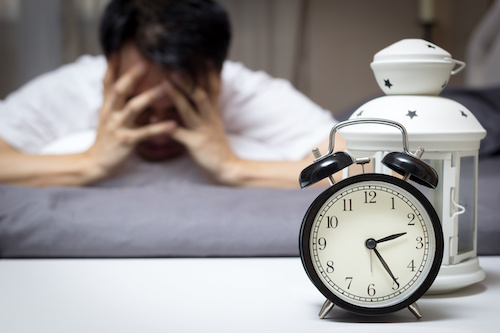
However, the stress and worry of the COVID-19 pandemic has generated fragmented sleep, unusual sleep schedules, and heightened anxiety levels.
Sleep is crucial for our body to restore and recover, but how do your stress levels during the pandemic affect it?
The Effects of Coronavirus Disruptions
The pandemic has impacted most aspects of day-to-day life, resulting in disruptions to the sleep we deserve. Daily schedules have been shaken up, and routines have had to be reimagined. Financial concerns, health anxiety, and stay at home orders are causing elevated levels of stress, worry, and anxiety.
The CDC notes that stress during the pandemic can cause disruptions in sleep and eating patterns, which can lead to both trouble falling asleep and loss of focus throughout the day. The lack of routine or structure can directly affect your nighttime sleep and cause late bedtimes, oversleeping, and naps, resulting in low energy levels throughout the day.
Due to the stay at home order, we are experiencing limited exposure to natural light. When it’s light outside, your body responds by waking up and preparing for the day. However, when it’s dark, your body is ready to unwind and sleep. By staying indoors, your circadian rhythm is impacted because of the lack of light-based sleep cues.
Along with the absence of natural light, the increased amount of blue light at night from your cell phones, televisions, and iPads alerts the brain that it is not time for bed and to halt melatonin production.
Stress and Sleeplessness
The increase in stress and constant flow of information surrounding COVID-19 leads to an overactive mind.
The amount of stress and your sleep quality and quantity work hand-in-hand. When stress is present in your life, your brain’s neurotransmitters are affected, and cortisol levels are increased.
A sleep medicine doctor, Brandon Peters-Mathews, explains “These chemicals [cortisol] may shift the sleep-wake balance in the brain, which may increase sleep fragmentation and lead to insomnia (habitual sleeplessness or inability to sleep) and increased dreaming.” Hindering a good night’s sleep, anxiety launches the fight or flight response.
When nighttime sleep disruptions occur, anxiety may spark, causing your mind to overwork. And when sleep is disrupted, the quality and quantity of your sleep decreases, leading to the formation of anxiety the next day. With the lack of sleep and the increase in stress and anxiety, an unhealthy cycle is created.
Stress and the Immune System
As highlighted by the World Health Organization, utilizing preventative care helps in the fight against COVID-19, and the presence of stress can actually affect your immunity.
In the presence of stress, cortisol levels spike, and in short times of stress, cortisol can actually prevent inflammation, improving your immunity. However, frequent stress and increased cortisol in your blood will expand the inflammation in your body.
With added stress, mental health concerns like anxiety and depression will rise, which also causes large amounts of inflammation. Over long periods of time, the stress induced inflammation can weaken your immune system, making it more difficult to protect you against illness.
Pandemic Dreams
Have you been experiencing dreams that stray away from the dreams you are used to?
Enter in pandemic dreams, which act as your body’s way of handling and processing the tough experiences and emotions present during the pandemic.
You dream when you step foot into your rapid eye movement (REM) stage of your sleep cycle. A professor of neuroscience, Matthew Walker, describes that “REM sleep essentially provides the brain a form of overnight therapy [in which] dreaming helps process difficult emotional experiences.” Dreams help us to make sense of what occurs throughout our daily lives.
However, when sleep is frequently disrupted throughout the night by large amounts of stress and anxiety, the REM sleep stage may not be reached as you may not have slept for long enough.
To prepare yourself for bedtime, Walker recommends taking a shower or bath before getting in bed to help decrease your body temperature when you get out. To achieve deep sleep and work through emotions within the REM stage, preparing yourself for bed will set you up for sleep success.
During this uncertain time, know that you are not alone. Stress, anxiety, and worry are normal during this COVID-19 pandemic, but getting a good night’s sleep can help to increase your immunity and protect you against illness.





One Response
Thank you for producing these easy reads with critical facts! I enjoy sharing with patients, colleagues, and friends!